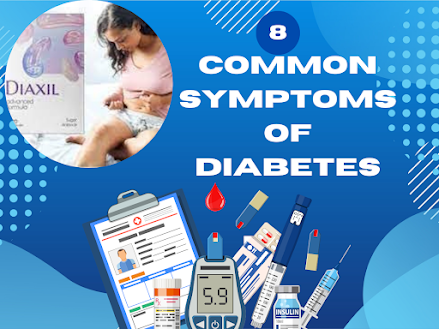The common symptoms of diabetes
can vary depending on the type of diabetes and the individual. Here are some general symptoms
associated with diabetes:
1. Frequent Urination (Polyuria):
• Explanation: Elevated
blood sugar levels can lead to increased urine production as the kidneys work
to eliminate the excess sugar from the body.
• Note: Frequent
urination may also lead to increased thirst.
2. Increased Thirst (Polydipsia):
• Explanation: Dehydration
from frequent urination can result in increased thirst as the body tries to
compensate for fluid loss.
• Note: Excessive
thirst can contribute to increased water intake.
• Explanation: Despite
increased hunger and food intake, individuals with diabetes may experience
weight loss due to the body using muscle and fat for energy when it cannot
properly utilize glucose.
• Explanation: Insufficient
insulin or ineffective use of insulin can lead to the cells not receiving
enough glucose for energy, causing fatigue.
• Explanation: High
blood sugar levels can cause changes in the shape of the eye's lens, leading to
blurry vision.
• Explanation: Diabetes
can affect blood circulation and the body's ability to repair itself, resulting
in delayed wound healing.
7. Tingling or Numbness in Extremities (Neuropathy):
• Explanation: Prolonged
high blood sugar levels can damage nerves, leading to tingling or numbness,
especially in the hands and feet.
8. Increased Hunger (Polyphagia):
• Explanation: Cells
may be deprived of energy due to the inability to use glucose properly, leading
to increased hunger.
It's important to note that these symptoms may develop gradually, and not everyone with diabetes experiences all of them. In some cases, individuals may not have noticeable symptoms, especially in the early stages. If you suspect you have diabetes or experience these symptoms, it's crucial to consult with a healthcare professional for proper diagnosis and management. Early detection and intervention are essential for effective diabetes care.

